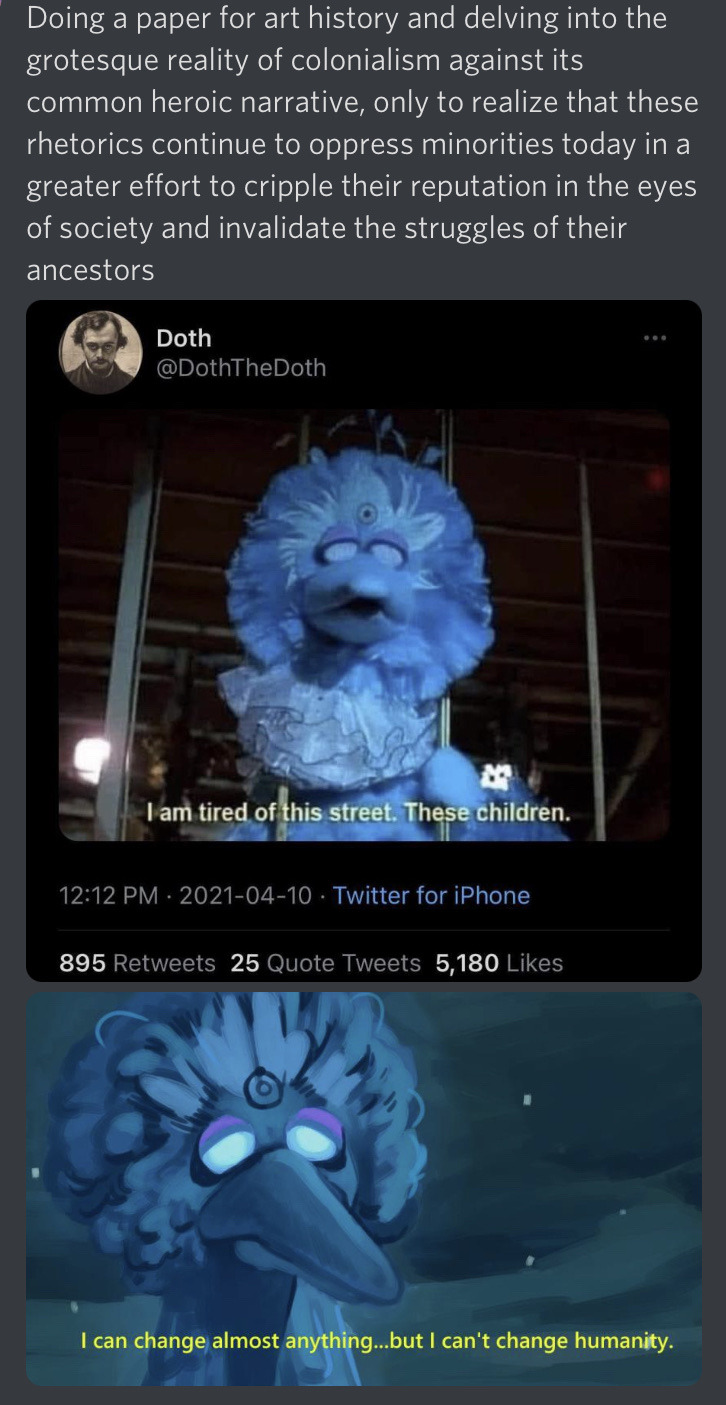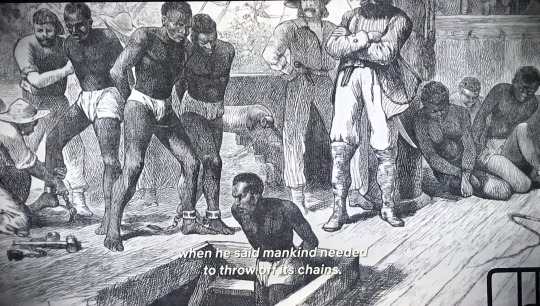#european colonialism
Text
34 notes
·
View notes
Text
I WANNA WRITE A HISTORY BASED MUSIC LIN MANUEL MIRANDA TOBY MARLOW AND LUCY MOSS HAVE INSPIRED ME PICK A CATEGORY AND ONCE ITS DONE IF YOU HAVE ANY CONTRIBUTIONS YOUR WELCOME TO ADD THEM
#the holocaust#european colonialism#the great depression#the french revolution#rosa parkz#anti-slavery#anti-segragation#anna frank#joan of arc#queen victoria#lady bathory
10 notes
·
View notes
Text
Colonial appropriation of indigenous lands often began with some blanket assertion that foraging peoples really were living in a State of Nature – which meant that they were deemed to be part of the land but had no legal claims to own it. The entire basis for dispossession, in turn, was premised on the idea that the current inhabitants of those lands weren’t really working. The argument goes back to John Locke’s Second Treatise of Government (1690), in which he argued that property rights are necessarily derived from labour. In working the land, one ‘mixes one’s labour’ with it; in this way it becomes, in a sense, an extension of oneself. Lazy natives, according to Locke’s disciples, didn’t do that. They were not, Lockeans claimed, ‘improving landlords’ but simply made use of the land to satisfy their basic needs with the minimum of effort. James Tully, an authority on indigenous rights, spells out the historical implications: land used for hunting and gathering was considered vacant, and ‘if the Aboriginal peoples attempt to subject the Europeans to their laws and customs or to defend the territories that they have mistakenly believed to be their property for thousands of years, then it is they who violate natural law and may be punished or “destroyed” like savage beasts.’ In a similar way, the stereotype of the carefree, lazy native, coasting through a life free from material ambition, was deployed by thousands of European conquerors, plantation overseers and colonial officials in Asia, Africa, Latin America and Oceania as a pretext for the use of bureaucratic terror to force local people into work: everything from outright enslavement to punitive tax regimes, corvée labour and debt peonage.
From The Dawn of Everything: A New History of Humanity (2021), by anthropologist David Graeber and archaeologist David Wengrow
#the dawn of everything#david graeber#david wengrow#history#world history#colonialism#settler colonialism#imperialism#genocide#european colonialism#john locke#locke#archaeology#anthropology#quote#book quotes#native american
6 notes
·
View notes
Text
Belgium to return Patrice Lumumba’s gold tooth in bid to atone for colonial crimes
From the article:
'Western officials worried that Lumumba would favour the Soviet Union as a protector and allow Moscow access to strategically critical resources such as uranium.
After a military coup, Lumumba was overthrown, jailed, tortured and shot dead by a hastily assembled firing squad. Forty years later, Belgium acknowledged that it bore “moral responsibility” for his death. The CIA had also laid plans to kill the 35-year-old politician.
But it took decades for the truth about the circumstances of Lumumba’s murder to emerge.
In 2000 the Belgian police commissioner Gerard Soete confessed that he had dismembered Lumumba’s body and dissolved the remains in acid. In a documentary screened on German TV, Soete showed two teeth which he said had belonged to Lumumba.
...Belgium has recently begun to address the legacy of its exploitation of Congo’s rubber, ivory and timber. As many as 10 million people died from starvation and disease during the first 23 years of Belgium’s rule from 1885, when King Leopold II ruled the Congo Free State as a personal fiefdom. Others were murdered, or deliberately maimed to encourage others to work harder to fulfil impossible quota of lucrative resources.'
#belgium#democratic republic of the congo#drc#colonial legacies#colonialism#european colonialism#belgium is not innocent#cold war#a reminder that the 'cold war' displaced much of it's violence globally#millions died across Africa Asia & Latin America due to the struggle for power between the US + allies and the Soviet Union#also i cannot tell you just how much i hate how europeans have ensured the idea that africans are uniquely brutal#when they've done shit like this#and european history (like everywhere else) is littered with stories of extraordinary brutality
26 notes
·
View notes
Note
George III’s reign also saw the British invasion of Haiti in 1793. The British saw an opportunity to seize the Caribbean’s wealthiest colony, add it to their empire and restore slavery.
British forces arriving from Jamaica began a five-year occupation of parts of the Southern and Western provinces. The British started by occupying the Southern port of Jérémie and would eventually take Port-au-Prince itself in June 1794.
Again, such a history one should be proud of (I'm being sarcastic). This post definitely follows the last one HERE, where my answer to this one matches the previous.
The British monarchy remains terrifying in its acceptedness amongst English folk, too. Why be proud of a thing that began and licenced and continues to license organized financial, infrastructural, etc deprivation of both domestic and foreign people's?
2 notes
·
View notes
Photo

“Typical Scenes of Japanese-Conquered Sumatra,” Windsor Star. February 17, 1942. Page 21.
----
THE rich oil deposits of Sumatra are in the hands of the enemy following yesterday’s invasion by the Japanese of that section of the Netherlands East Indies. The invaders paid heavily for their victory as result of stiff Dutch opposition. Oil fields such as those shown above were fired by the Dutch before they fell back. The fields will be useless for months.
The conquering Japs found no stores of oil waiting for them, such as shown above, when they finally overcame still Dutch opposition and landed in Southern Sumatra yesterday. The valiant Dutch fired all oil deposits and stores before they were swept aside. Damage is reported to have exceeded $100,000,000 as the Dutch applied the scorched earth policy.
INVASION by the Japanese yesterday ended Dutch development of Sumatra as the valiant defenders were forced to destroy decades of patient building by the colonists. Under government direction, the rubber industry was being developed rapidly to take its place with the rich oil industry. A Sumatra rubber plantation is shown above. Gone is an allied tire source.
SHOWN above is a typical port of Southern Sumatra m tne Netherlands East Indies where Japanese hordes landed yesterday to capture the rich oil centre of Palembang. The main force of the sea-borne Japanese invasion was directed from the island of Borneo, which lies to the east. The invaders suffered heavy casualties.
#sumatra#invasion of sumatra#dutch east indies campaign#nederlands-indië#dutch east indies#dutch imperialism#european colonialism#荷蘭東印度群島戰役#war propaganda#oil industry#rubber plantation#war industries#resource extraction#resource capitalism#world war II#pacific war
8 notes
·
View notes
Text

Eat, my children
#I never post but this was a hit with my discord buds#art history#colonialism#colonizers#European colonialism#oppression#false narrative#false narratives#funny#memes#that feels wrong to add at the end
1 note
·
View note
Text
A post about growing European imperialism in Africa by 1900, and relating it to the novel Things Fall Apart.
#things fall apart#european imperialism#africa#19th century#20th century#college paper#imperialism#internet archive#wordpress#2015#religion#politics#disease#european colonialism#colonialism
0 notes
Text

Hello everyone!
The purpose of this blog is to serve as an archive of various materials relating to European history and culture for those who wish to dismantle European colonialism, European supremacy and whiteness and white supremacy in order to create a better world for all of humanity.
In order to achieve this goal, we must be familiar with our collective histories and find the pieces that will continue to serve us on our mission.
We must also be aware of the harm and destruction that we have caused in the past and continue to benefit from in the present so that these oppressive structures can be dismantled.
Join us by using this archive to research various topics, submitting material to be housed in the archive, and sharing these resources with others.
Thank you, and blessed be!
Matthew 🌙
1 note
·
View note
Text

African prophets shared a lot of parallels with biblical ones. Just as God called biblical prophets, the people believed that at times of great disaster, the Supreme Being would speak to select men and women to guide the tribe.
Seers and their prophecies bear much cultural and historical relevance to African history. The fantasy enthusiast in me wanted to find out if something mystical was happening here. Perhaps something divine?
After all, unlike biblical prophecies that took place forever ago, African ones were made within the past 200 years and were promptly fulfilled. I will briefly discuss a few such prophecies, their relevance to the events that occurred, and most importantly, whether these great seers could genuinely tell the future!
The Iron Snake
The oral records of Kikuyu land in Central Kenya describe seers that saw the coming of strangers with skin the color of tiny white frogs that would sail in from the ‘big water’ — the ocean.
These strangers would also bring an iron snake that belched fire, and later they would fly like butterflies.
Prophecies of the iron snake refer to the railway that would later be built connecting the interior of Kenya to the Coast. Still, in some accounts, an animal from the sky with an iron mouth that would destroy the land refers to airplanes.
The prophetess Syokimau who is said to be among the greatest seers to have lived predicted that a long, narrow snake would move from the Coast toward the setting sun.
Here’s her prophecy retold in the book Akamba from Within by Muthiani:
I can only imagine how terrifying or utterly ridiculous these prophecies must have sounded to the natives back then. White frogs that rode on fiery iron snakes and that could fly like butterflies. Now that’s a story fit for a campfire.
It wasn’t unusual then that Ireri wa Irugi — a famous seer — wasn’t believed when he predicted a fierce and terrible invasion by the Europeans.
Magical Sticks
The great sage and healer, Mugo wa Kibiru, predicted that the pale strangers would carry magical sticks that would produce fire and that it would be foolish for the warriors to confront them with spears.
This is but one example of the many prophecies about firearms. Now, you wouldn’t dare call yourself a seer back then if your divine messages didn’t mention the one weapon that would bring seasoned warriors to their knees.
Prophecies on the magical sticks and the iron snake were in plenty because they posed the greatest dangers to the communities. The railroad would eventually allow British soldiers to harness logistical power crucial in subduing resisting tribes, and the firearms were… well, superior weapons.
Cultural Overhaul
In the oral records of the Embu people of Mount Kenya, the Seer Ireri wa Irugi foretold the defeat of the Embu tribe.
Mugo wa Kibiru also prophesied that there would be a cultural erosion of tribal customs where youth would adopt the ways of the invaders.
For the tribes, culture and tradition were essential to the tribe’s strength. It kept them unified, gave them rules, and gave the people guided purpose.
So anything that threatened tradition threatened the people.
Relevance
Prophecies in colonial Kenya were influential when communities chose between resisting or collaborating with the British, and perspectives on this were often split along generational lines.
The older generation consisting of elders in leadership roles sought collaborations. They viewed the prophecies as a warning not to engage in hostilities with the British. They believed there would be more to gain in collaborating instead. To the elders, resisting meant certain death.
The younger generation thought differently. They held warrior roles in the communities, and the prophecies were seen as a means to gain crucial information on their would-be adversaries. Yes, the prophecies foretold of crushing defeat. But if they knew what the enemy would do before they did it, then surely they could beat them.
To them, the prophecies were, first and foremost, a warning of what would happen if they did not resist the men ‘full of evil deeds and greed.’
Prophecies: Fact or Fiction?
While these prophecies hold much significance, it is important to note that there are challenges in proving their ‘prophetic validity.’
First of all, the accounts of all nineteenth-century seers were collected decades after the events they prophesied had already come to pass.
Some historians also argue that the prophecies were initially vague and abstract and probably took forms similar to riddles. But as time passed and the prophecies were passed down orally, the people modified them, adding details of things that had already come to pass — like the railroad being built.
Furthermore, prophecies of strangers arriving were made when Central Kenya had already started receiving news of strangers from the Coast. Most hadn’t personally seen these strangers — Europeans and Arab traders — but news of them is believed to have already made its way to Central Kenya through trade.
Even so, there’s still a lot of mysticism surrounding the old Kenyan Seers and their prophecies. There isn’t enough proof beyond speculation to discount these prophecies.
But whether fact or fiction, these prophecies had tangible effects on the people and the world around them. They possessed an undeniable power in rallying the people to a common cause, a common narrative:
Endurance.
#african traditional religion#colonialism#kenya#solokimau#Where Myths and History Meet: How Did African Seers Correctly Predict Colonialism#european colonialism#religious interlopers#destruction of African Traditions
0 notes
Text
With the Wattasids the long and bloody history of European colonialism in Africa begins in its modern form:
In turn, too, the Wattasids also show why the Saadi were so willing to adopt the influence of the Gunpowder Empires and the example laid out for them by Suleiman the Magnificent, and that the very expansions and aggression from the perspective of the Sahel and 'Sub-Saharan' Africa could be in its own way a reaction to imperialist aggression in North Africa.
The Wattasids displaced the Marinids and then immediately confronted the first waves of European colonialism under Henry the Navigator and his immediate successors. In the course of these confrontations Henry was able to successfully seize and hold various coastal enclaves, most particularly Ceuta, and in that process cast the first shadows of European colonialism. This was also the beginning of the process that would help to shape the evolutions of the Kingdoms of Ashanti, Benin, and Dahomey, as well as their more interior neighbors.
It began rather simply in places geographically closer to Spain and Portugal than the Sahel, and in these clashes the two sides would evolve the institutions that brought the doom from the north and the context that would shape the dawn of the slave trade.
And that, as well as the history of this dynasty's struggles and its ultimate failure that saw it displaced by the Saadi of Tondibi and Alcacer Quibir fame, is where the long history of Islamic rivalry and ebbing and flowing with European colonialism in Africa starts.
#lightdancer comments on history#black history month#african history#european colonialism#portuguese empire#henry the navigator#wattasid dynasty#african resistance to colonialism
0 notes
Text
on colonialism
Colonialism, where it means the practices of the extended high period of extra-European imperial expansion, seems to be losing its discursive importance through overuse (in a way just opposite to that in which the heyday of academic "postcolonialism" put colonial culture itself at center stage). As a discourse, it has gone from forming the basis for a powerful politics of non-European and non-white peoples, and an academic field of revolutionary proportions, to often being a throwaway accusation of political or cultural dilution in any community of color, spurred by the lingering heritage of white European supremacy -- verbiage now sometimes made nearly trivial, and eminently repeatable, by campus culture and activist pundits. The heritage of European culture (and of its descendant, antebellum American culture and the legacy of slavery in the US) is always reaching from its sickbed to continue "colonizing" everything.
THIS is an important question: suppose ... that neither France, nor England, nor any other European power had ever arrived in, say, North Africa. (Perhaps ironic to suppose, when we think of Tennyson planting the tree of western greatness there, safe from the east, out by Morocco (ironic in itself) ...). Imagine a barrier in the ocean, or impassable seas, or whatever; one way or another, Europe is barred from that shore. Picture then a string of North African kingdoms along the Mediterranean, living out an alternate history from, say, the seventeenth century onward. (1) It is absolutely unthinkable that these kingdoms should have somehow lived in harmony without sometimes seeking to annex each other's territory, topple each other's regimes, exploit each other's resources, and so on. It is unthinkable simply because until the postwar era, that kind activity was to be met with simply everywhere in the world (it still goes on in much of the world, even if Europe and the Americas have maintained an exceptional recent stability, up to the current Russia-Ukraine war ...). The perennial invasions and occupations between native states in Africa, Asia and the Americas are everywhere in those states' past, just as they are in Europe's -- such events are the run of political history.
Claim (1), differently put, is simply that European colonizers of whatever stripe (military, economic, missionary, etc.) did not bring, much less invent, political/economic domination and forcible suppression of native populations which would not otherwise have happened eventually in every case. (Even though, because Europe was the actual perpetrator, colonial subjugations happened very differently than they otherwise might have, and most importantly at a higher pitch -- though nowhere either do we now see "soft" colonialism endorsed: indeed, from the twentieth century on, it is often deemed more insidious than the elder kind, for example by Adorno.) If European Nation A had not arrived to subjugate and exploit the resources of North African Nation X, it is a historical inevitability that neighboring North African Nation Y would more or less have done so in its own time. To assume anything else, of course -- to imagine a political Eden of peaceable nonwhite kingdoms, unmolested by the warlike whiteness of Europe, indeed to imagine such a condition existed before European arrivals -- would be what was once called ... orientalism, a romanticizing racism; the best literature from nonwhite civilizations make this clear, that European meddling and greed only exacerbated the homemade conflicts within cultures and regions (e.g., the British in India).
Nevertheless, it is crucially true that because of the populations involved, European colonialism had a special, all-important racial component -- it was everywhere a matter of largely white ethnicities set against or over nonwhite ones. This is, of course, the curse that has earned colonialism its name in our time -- it is the history of the white race's attempted subjugation of the world. And yet again (1a), history is not shy with examples of one nonwhite people persecuting another on the basis of race, of skin color -- and from Africa to Asia to the Americas, it seems to be a tragic fact of history (psychology, cognition, culture?) that it is often those of paler skin who look down on and seek to subjugate those with darker, just as greater paleness within a given ethnicity has typically been a mark of beauty -- and this has pretty clearly been true in many societies before the importing of European beauty norms. (Early China, for example; though surely there seem to have been interesting if relatively short-lived exceptions -- eg, the Nubian kings of Egypt.)
Lastly (2), for many reasons long discussed, European imperial powers had, by the start of the colonial period, attained to a technology in seagoing and armaments that no other civilization could match. (England, for example, which had hitherto been content to colonize the other British isles, and perennially hoped to do the same in France, was now able to look beyond its near neighbors.) This fact also allowed Europe to colonize at greater distances than other civilizations, as well as with greater force, and with this came cultural contrasts that usurpations among nations sharing a continent would never have generated. (The parallel in the US is that America developed the institution of slavery, present for millenia in white and nonwhite civilizations, to an insane pitch, and did so using a population which was no more native to the North American continent than its slave-owning population was, the actual native population having been already subjugated ... .)
Europeans, then, were both the palest* of colonizers, and the most lucky, skilled and successful. Neither of these facts, of course, will ever be a moral accolade -- and yet only the skill and success should be an object of moral condemnation, nor is it clear that both facts together should morally spell the utter doom that they do among some who seek to undo the damage of the colonial heritage. Knowing how far back into the past to reach in our efforts to change outcomes -- eg, reparations in the US -- grows impossible when imperialism/colonialism becomes the original sin from which all disasters descend up to the present day, when white Europe and white America are cast as the worst villains that humanity and its better nature have ever faced. (And of course, if it turned out that colonialism and empire were the original sin, that sin would predate imperial Europe by thousands of years ...)
This is also clearly no natural-law re-argument for "white man's burden," no idea that Europeans made successful war in places where less efficient conflict between native peoples might have meant only worse or more protracted destruction. In this context, war is war, invasion and occupation are invasion and occupation, no matter color of skin, history, distance. etc. But there IS a moral danger here: the danger of condemning European civilization for having shown improper restraint, so to speak. For not being the world's elder brother who should have known better, for not exercising a benign paternalism instead of the highly rapacious one which was historically realized.
European colonialism as we know it is not the only criminal in the world of racial subjugation (no more than American slavery). It is, however, the most successful criminal, and the one that got the furthest without being caught. Like any such criminal, it has the most to answer for, and much of the undoing of its legacy is right. But just as we often see ethnic and racial conflicts intensify in the wake of colonial withdrawal, just as we see racial antagonisms in the US already rising to the surface wherever white/black tensions which have defined the past three hundred years threaten to retreat, we cannot suppose that once we have completed this work (which we also find doesn't really admit of completion without some Orwellian gymnastics, or a wholesale tearing down of the resources which we do now have, and which we can try and put more equitably at the disposal of populations today), we will be free of the colonialist impulse -- whether in its hard or soft versions, whether involving white peoples or not. Colonialism, cultural appropriation, and the benevolent blending of cultures - they are faces of the same die. Living on a closed manifold, there are no shores unreached, no more than there are impassable Homeric barriers in the seas; we are all always already and eventually colonizing one another, it is in the nature of culture. Some instances will be unjust, others tolerable, others beneficial -- to cease to distinguish is to call either for the death of all culture, or for the supremacy of one.
We must always remained grounded in time and place as these present manifest racial conflict to us, take each situation case by case, fight each battle where it is met; and yet we will not progress by wrestling too narrowly or piously with each racial antagonism as it emerges, nor by generalizing verbs like "colonize" to become lazy metaphors for underarticulated and underargued circumstances. It is past time for our species to step back and cultivate a larger, global view of the antagonism between the darker and the lighter, and to address the associated cognitive, socioeconomic and political issues as of a piece with one another; and surely the most devoted intersectionalists would be willing to admit, for example, that just as white vs black political inequity in America summons issues of economic inequity, social inequity, gender inequity and so on, that white vs black also summons the many iterations of black vs Asian, Asian vs white, Asian versus darker Asian, African versus darker African ... and so on.
*It doesn't erase or devalue the racial history in the United States, for example, to begin to move in a global discourse away from a white-or-other binarism and toward a politically more awakened view of the history of darkness and paleness as a spectrum (and if gender is a spectrum, skin color most certainly is!).
0 notes
Text








“After arriving in America to forge a life of honest, hard work and toil, many of these colonists realized they couldn’t be arsed, so they stole people from Africa and made them do it instead. You might think these were precisely the people Rousseau had been talking about when he said mankind needed to throw off their chains. But they weren’t. Like many humanists, he’d found a clever loophole. By not thinking of slaves as human, he was free to not give a shit.” - Philomena Cunk, “Cunk on Earth”
#philomena cunk#cunk on earth#jean jacques rousseau#slavery#colonialism#American history#european history#us history
4K notes
·
View notes
Text
Mom? Can you pick me up? People on Twitter are doing noble savage "European colonialism is worse than Islamic colonialism" arguments again.
#Personal#history#Just because the linguistic and cultural impacts of European colonialism were more enduring doesn't mean Islamic colonialism wasn't just as#violent and terrible
570 notes
·
View notes
Photo

“Islands of the Fighting Dutchman,” Kingston Whig-Standard. January 27, 1942. Page 11.
---
These are the Dutch East Indies, resource-laden cluster of islands stretching one-eighth of the way around the globe at the equator. Their forces are countering with stiff assault made by the Japanese forces seeking the riches and the strategic position offered by control of the islands.
#dutch east indies campaign#nederlands-indië#dutch east indies#netherlands east indies#荷蘭東印度群島戰役#world war II#pacific war#imperial japan#rubber plantation#resource extraction#resource capitalism#european colonialism#dutch imperialism#abac theatre
1 note
·
View note